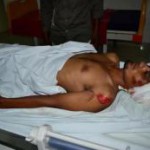May 31st – June 6th
Following the break-up of the Progressive Coalition, this week saw a resulting adjustment of party affiliations after an initial purge of Jumhooree Party (JP) appointees.
After the ruling Progressive Party of Maldives (PPM) followed through on threats to remove JP members – the most notable being Transport Minister Ameen Ibrahim – Environment Minister Thoriq Ibrahim announced his decision to switch to the PPM.
After having picked up three of the five MPs elected as independents since the March elections, the PPM rounded off their new signings this week with Nilandhoo MP Abdulla Khaleel.
This addition brings the party’s parliamentary group up to 38 MPs, giving it a simple majority alongside its remaining ally, the Maldivian Development Alliance.
A final report from the EU’s Majlis election observers this week called for adapted legislation to clear up the issues of jurisdictional overlap and campaign financing which blighted recent polls.
While the Majlis made preparations for the assembly of its standing committees this week, former President Mohamed Nasheed told diplomats in Colombo that a constitutional adjustment to a parliamentary model of governance would resolve the perennial issue of failed coalitions.
Nasheed also made known his intention to stand for the Maldivian Democratic Party leadership in August, prompting senior member ‘Reeko’ Moosa Manik to reiterate calls for new leaders to emerge.
The Syrian civil war continued to force itself onto the agenda, literally in the case of an anti-war hacker who infiltrated over 100 hundred government websites in what experts saw as a result of poor security measures.
Less direct threats to the country were depicted by Home Minister Umar Naseer during Martyrs’ Day, suggesting that the country ought to be prepared for “invisible” threats to its nationalism and its faith.
The government’s rhetoric and response to recent news of home-grown jihadis prompted accusations that it was tacitly supporting such activity, as did the invitation of controversial Sheikh Ibrahim Shameem Adam to the police force’s Martyrs’ Day event.
The jihadi Bilad Al Sham Media group continued to reveal details of Maldivians fighting in Syria – mocking the police’s attempts to investigate, while an MoU signed with the UN will see Maldivian troops deployed in peacekeeping missions over the next two years.
Elsewhere, the police launched a special operation to crack down on a spate of robberies while the Supreme Court upheld a prior decision to reinstate an officer dismissed in relation to a rape case.
After investigations into the police’s handling of the Anbaraa, Amnesty International called for an investigation into allegations of brutality, and Hope for Women expressed outrage at the publication of an article in local media which suggested underage girls were voluntarily engaging in prostitution.
The government this week rejected claims of negligence at Fuvahmulah Hospital after a series of disturbing mishaps within a few days.
Responsibility for the failure of Laamu Gan’s sewerage system was also deflected by government departments after the local council accused it of offering on assistance in what it labelled a “health disaster”.
In Malé, the city council revealed it was relying on private donations to pay for pre-Ramadan mosque repairs after the government had failed to provide the required funds.
In other news, the President’s Office assured that asylum seekers breaching Maldivian law abroad would be assured of prosecution upon their return to the country.
President Abdulla Yameen’s promise to create a more business-friendly environment for foreign investors moved a step closer with the introduction of the special economic zones bill.
Yameen pledged respect for the local ecosystem during any prospective development projects during a speech to mark World Environment Day.




